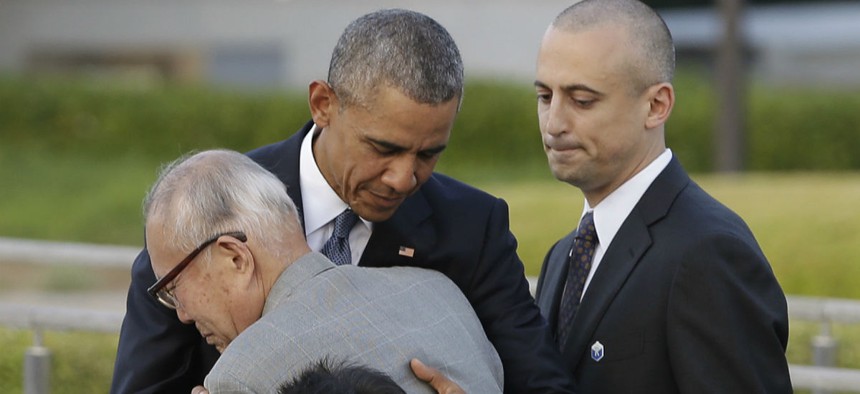Obama's Historic Hiroshima Visit
The president is the first sitting American leader to make a trip to the city that was bombed by the U.S. with a nuclear device.
President Obama became the first sitting American leader to make a trip to Hiroshima, the Japanese city bombed by the U.S. with an atomic device in 1945, and called for a “moral revolution” to accompany technology such as nuclear weapons.
“Technological progress without an equivalent progress in human institutions can doom us,” Obama said in a speech after a ceremony at the Hiroshima Peace Memorial Museum. “The scientific revolution that led to the splitting of an atom requires a moral revolution as well.”
After his speech, Obama met with hibakusha, the survivors of the attack, many of whom are now in their 70s, 80s, and 90s. He shook hands with them and even embraced one of the survivors, Shigeaki Mori, 79.
“The president gestured as if he was going to give me a hug, so we hugged,” Mori said .
At an earlier ceremony at the memorial, Obama and Shinzo Abe, the Japanese prime minister, stood in front of the eternal flame. Both men laid wreaths at the memorial. The American president also signed a guest book: “We have known the agony of war. Let us now find the courage, together, to spread peace, and pursue a world without nuclear weapons.”
At a news conference Thursday in Japan, which he was visiting for a meeting of the Group of 7 industrialized nation, Obama provided the rationale for why he’s the first American leader to visit the memorial: “Part of the reason I’m going is because I want to once again underscore the very real risks [of nuclear weapons] that are out there and the sense of urgency that we all should have.”
You can watch Friday’s ceremony here:
Many survivors of the nuclear attack had hoped the president would apologize for the use of nuclear weapons, but Obama made clear he would not. The bombing on August 6, 1945, ultimately led to Japan’s surrender in World War II.
Many of Japan’s neighbors, including China and South Korea, which suffered under Japan’s imperial army during World War II, were opposed to an apology. The scars of their wartime occupation by Japan and the treatment of their citizens during that period is a raw wound to this day. Indeed, Obama touched on Japan’s actions in his remarks at Hiroshima, referring to “the same base instinct for domination or conquest that had caused conflicts among the simplest tribes, an old pattern amplified by new capabilities and without new constraints.”
Abe, the Japanese prime minister who accompanied Obama to Hiroshima, said in his remarks that events like Hiroshima “must not be allowed to occur again.”
The bombing of Hiroshima and Nagasaki, three days later, killed an estimated 200,000 people.
Two other American presidents have visited Hiroshima : Jimmy Carter visited on May 5, 1984, long after he’d left the White House. Richard Nixon went on April 11, 1964, four years before he won the presidential election.



